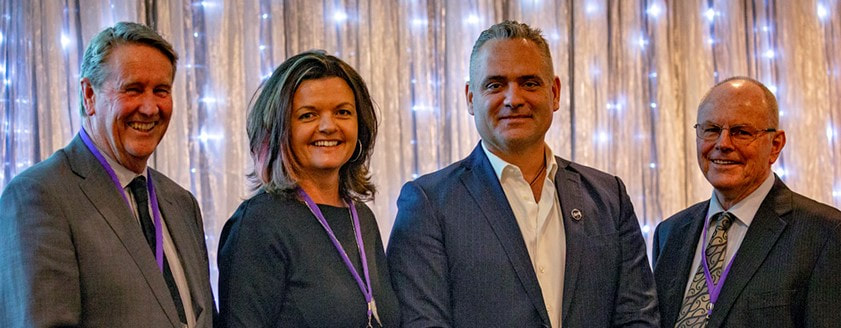|
Dr David Wilson, myself, Deputy Leader - NZ First, Fletcher Tabuteau & Bill Shepherd, EDNZ Conference 2018. Photo credit: Sue Shepherd.
‘Economic development is a public health outcome’, so said Ben Lucas at the NZ Economic Development Conference I attended last week. He said that the biggest impact on health is being in (good) work - health is wealth, so to speak. I found the statement quite profound. Encouragingly, another take-away, which supports this thinking, was the call that economic and social policy needs to be integrated. Yahoo! I have been saying this for years. I do not believe that one can function without the other, i.e. a strong, cohesive social foundation, leads to strong, sustainable economic activity. In other words – an integrated approach rather than a siloed one. The conference theme was all about inclusive growth. Wikipedia tells us that Inclusive Growth is a concept that advances equitable opportunities for economic participants during economic growth with benefits incurred by every section of society. This concept expands upon traditional economic growth models to include focus on the quality of health, human capital, environmental quality, social protection and food security. Overall, a wonderful goal. We could most certainly do with a more inclusive approach to prosperity. However, I do take issue with the constant use of the word ‘growth’ and raised this at the conference. The Wikipedia description above says ‘during’ economic growth. What happens when we aren’t growing? As many places in our district and country are not. One of the more sobering but important presentations was from a representative from the Maxium Institute – talking about decline (or de-growth). Noting that regional development strategies need to be comprehensive and include both growth and decline policies at the same time to be successful. Moving from a bigger, better, faster, cheaper approach to smaller, better, healthier and more sustainable thinking. When you consider that of the 11 regional well-being indicators, Northland is bottom in four (access to services, community, income and education), it is a sharp reminder that we need to have some big community discussions - on many levels - and they won’t necessarily be easy ones. As an example, rates are already seen as unaffordable in many areas and the growing demands for better services only puts further pressure on. The Local Government Think Tank presenter suggested that success for New Zealand communities requires a ‘whole of government’ approach focused on both economic and social outcomes ...’ I would suggest that success for communities requires a whole of community approach, with government (local and central) part of the equation. I found the conference last week highly valuable and I am encouraged by the movement of thinking to a more inclusive approach. However, I am reminded of Kate Raworth’s words in my last column, who asked the question, “how do we thrive, whether or not we grow”. An exciting challenge/opportunity to address moving forward.
0 Comments
|
AuthorTania McInnes. Archives
January 2024
Categories |

 RSS Feed
RSS Feed

